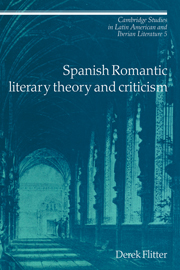Book contents
- Frontmatter
- Contents
- Preface
- List of abbreviations
- Introduction
- 1 Böhl von Faber and the establishment of a traditionalist Romanticism
- 2 The consolidation of Romantic ideas: 1820–1833
- 3 The exiles, liberal Romanticism and developments in criticism
- 4 Condemnation and clarification in the literary debate
- 5 Reaffirmation of Schlegelian principles in literary criticism
- 6 The religious spirit in literary ideas and the influence of Chateaubriand
- 7 The perception of literature's rôle in society
- 8 Romantic traditionalism in the work of Fernán Caballero
- 9 Conclusions: The mid-century
- Notes
- Bibliography
- Index
2 - The consolidation of Romantic ideas: 1820–1833
Published online by Cambridge University Press: 02 November 2009
- Frontmatter
- Contents
- Preface
- List of abbreviations
- Introduction
- 1 Böhl von Faber and the establishment of a traditionalist Romanticism
- 2 The consolidation of Romantic ideas: 1820–1833
- 3 The exiles, liberal Romanticism and developments in criticism
- 4 Condemnation and clarification in the literary debate
- 5 Reaffirmation of Schlegelian principles in literary criticism
- 6 The religious spirit in literary ideas and the influence of Chateaubriand
- 7 The perception of literature's rôle in society
- 8 Romantic traditionalism in the work of Fernán Caballero
- 9 Conclusions: The mid-century
- Notes
- Bibliography
- Index
Summary
Between 1820 and 1823, Spain enjoyed a respite from absolutism during the trienio constitucional. As we might expect, there was little promotion of Romantic ideas in these years, when the traditionalist theories of the Schlegels as presented by Böhl would have been unwelcome. The government of the time was engaged in resisting both internal conservative pressures and the external threat of the Holy Alliance, and Schlegelian theory, avowedly antagonistic to the progressive ideals of the Enlightenment and instead intimately related to a trenchant Catholicism, could only have aroused inimical feelings among Spanish liberals.
Evidence of continuing controversy in literary circles is, however, found in the notes added in 1821 by Manuel José Quintana (1772–1857) to his much earlier poem ‘Las reglas del drama’ (1791). Quintana made reference to current disputes regarding literary preferences, between ‘clasico’ and ‘romantico’ or ‘romancesco’. His own stance regarding the dramatic unities was an intermediary one: he had abandoned his previous insistence upon rigorous interpretation and observance of Classical precepts, and now saw that there were compelling reasons against, as well as in favour of the unities. English, German and Spanish dramatists, he observed, had all chosen to ignore them, and their work had not suffered as a result; they had indeed been able to produce every appreciable note of dramatic interest and effect.
- Type
- Chapter
- Information
- Spanish Romantic Literary Theory and Criticism , pp. 23 - 49Publisher: Cambridge University PressPrint publication year: 1991



